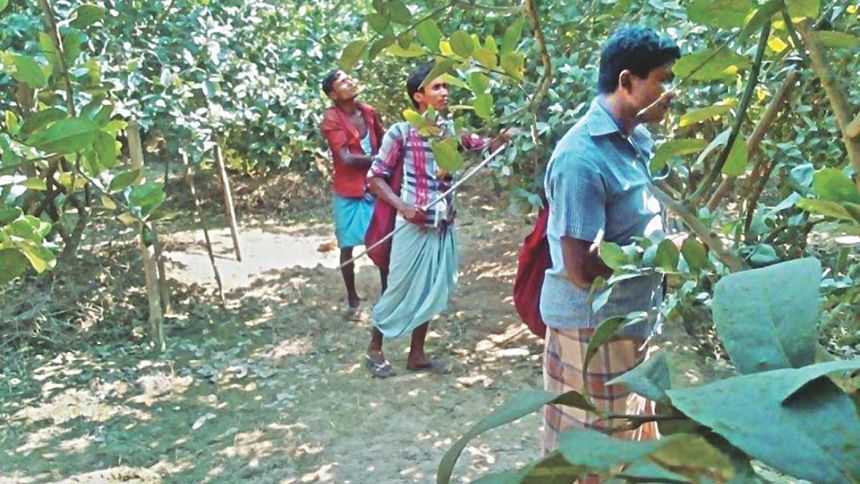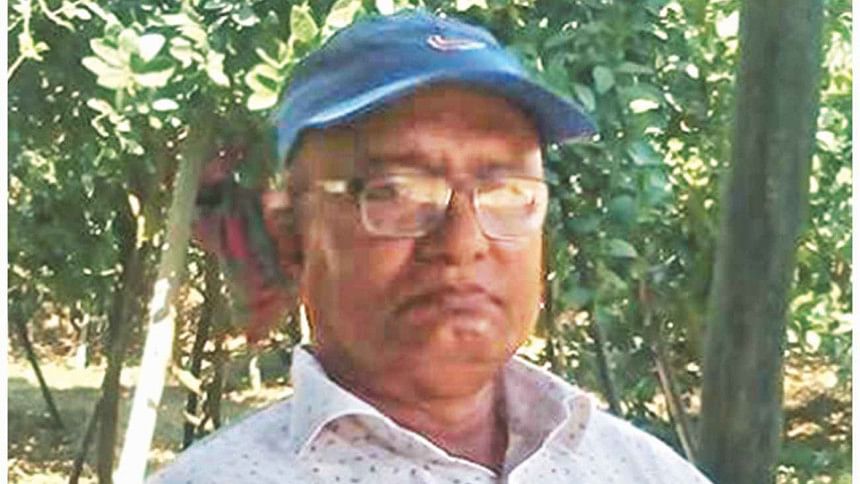Fighting tobacco with lemons

Freedom fighter Mozaffar Ahmed, 63, from Fulunir Char village in Kauarkhop union of Ramu upazila in Cox's Bazar, who at the age of 16 took up arms to fight in the 1971 Liberation War, has since been engaged in a new battle. Ultimately, he hopes to rid his district of harmful tobacco farms. It's a long-running campaign that relies not on armaments but primarily on lemons, a campaign that he leads by example.
Thanks to the patronage of foreign and local tobacco companies, tobacco farms are still a worrisome part of the landscape in Chakoria and Ramu upazilas in Cox's Bazar, as well as in adjacent areas of Bandarban. “I want to counter the aggression of tobacco companies,” Mozaffar says. “I established a multipurpose farm in Lot Ukhiarghona village in the hope that a successful tobacco-free farm could encourage other farmers to ditch tobacco.”
He planted mangoes and lemons, and incorporated a fish farm. He started rearing foreign-bred cattle. Mozaffar took tobacco farmers to see his farm.
The enormous 1991 cyclone caused significant damage to Mozaffar's farm but he did not quit. He sold some land to become re-established and by 1993 lemons were providing him an income of around Tk 1.3 lakh.
In 2012, Mozaffar set up a commercial seedless lemon orchard on two acres in Char Haitupi beside the Bakkhali river. He also introduced the seedless variety to 1.5 acres of his Lot Ukhiargona farm, reaching a total of 1,200 lemon trees on both properties, each of which can produce up to 200 lemons at a time.
“I harvest lemons year-round,” he says. “My orchards meet half the demand for lemons in Cox's Bazar.” Indeed, wholesalers from Teknaf, Cox's Bazar and Chittagong are in regular contact with Mozaffar, placing phone orders for his lemons.
“At present, demand for lemons is very high but production is low. As a result, the price is rising,” he says. One lemon can fetch as much as Tk 7 with wholesalers and retailers. “From February the price is at its best,” says Mozaffar. “It usually decreases slightly by the middle of May.” Mozaffar currently realises a net profit of Tk 10 lakh per annum from lemons.
In addition, he sells lemon saplings, 4,000 last year for up to Tk 20 each. “They will yield fruit once they reach three years of age,” he says.

His efforts to inspire others have met with success. According to local agriculture officials, over the last several years many tobacco farmers have switched to lemons; and lemons from Ramu are now supplied to markets in Comilla, Chittagong and Dhaka.
“We have been discouraging farmers from growing tobacco,” says Ramu upazila's agriculture officer Abu Masud Siddiqui. “Mozaffar Ahmed is a role model farmer in this community. He has personally initiated a 'green revolution' against tobacco cultivation, and throughout the district many regard him as an agricultural 'hero'.”
According to Abu Masud, there are currently more than 100 lemon groves in Ramu upazila and adjoining areas.
Kauarkhop union's chairman, fellow freedom fighter Nurul Haque, says much of the tobacco cultivation in Ramu was his. “Three years ago I moved away from tobacco,” he says. “Mozaffar Ahmed inspired me so I learnt how to farm lemons instead.” Other former tobacco growers in Naikkhangchhari and Tulatoli villages echoed Nurul's words.
“We want to recommend Mozaffar Ahmed for the Bangabandhu Agriculture Medal,” says ASM Shahriar, deputy director of the Department of Agricultural Extension in Cox's Bazar. “We have always supported his efforts by providing advice and assistance as we can.”
Mozaffar's innovative efforts are far from completed. Recently, workers in his Char Haitupi orchard have been busy transforming lemon groves into multi-crop farms, by planting brinjal, tomatoes and species of gourd between the rows of lemon trees.
Mozaffar also dreams of cold storage facilities, and perhaps a processing factory for lemons in Ramu.

 For all latest news, follow The Daily Star's Google News channel.
For all latest news, follow The Daily Star's Google News channel. 



Comments